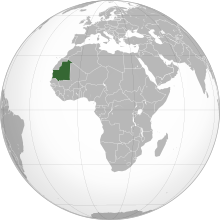LGBT rights in Mauritania
LGBT rights in Mauritania | |
|---|---|
 | |
| Status | Illegal since 1983: Islamic law (Sharia) is applied[1] |
| Penalty | Capital punishment for men, (not enforced[2]); prison and a fine for women |
| Gender identity | No |
| Military | No |
| Discrimination protections | None |
| Family rights | |
| Recognition of relationships | No recognition of same-sex relationships |
| Adoption | No |
Lesbian, gay, bisexual, and transgender (LGBT) people in Mauritania face severe challenges not experienced by non-LGBT residents. Both male and female kinds of same-sex sexual activity are illegal in Mauritania. Openly homosexual Muslim men face stoning to death, though there have been no known cases of executions caused by homosexuality charges in the country; whereas women who have sex with women face prison.[3]
Law regarding same-sex sexual activity
Law in Mauritania is based on Sharia.[4] According to the Article 308 of the 1983 Criminal Code, "Any adult Muslim man who commits an impudent or unnatural act with an individual of his sex will face the penalty of death by public stoning" (Rajm).[5][6] According to the Human Dignity Trust and Amnesty International, the death penalty has not been imposed since 1986.[2][7] Women face prison between three months to two years imprisonment, and a fine of 5,000 to 60,000 Mauritanian Ouguiya.[8]
Living conditions
This section needs to be updated. (September 2022) |
The U.S. Department of State's 2011 human rights report found that, "There were no criminal prosecutions during the year. There was no evidence of societal violence, societal discrimination, or systematic government discrimination based on sexual orientation. There were no organizations advocating for sexual orientation or gender-identity rights, but there were no legal impediments to the operation of such groups."[9] The State Department's reports of later years similarly report either no known arrests, or state that authorities did not actively enforce the law.[10]
Summary table
| Same-sex sexual activity legal | |
| Equal age of consent | |
| Anti-discrimination laws in employment only | |
| Anti-discrimination laws in the provision of goods and services | |
| Anti-discrimination laws in all other areas (incl. indirect discrimination, hate speech) | |
| Same-sex marriages | |
| Recognition of same-sex couples | |
| Stepchild adoption by same-sex couples | |
| Joint adoption by same-sex couples | |
| LGBT people allowed to serve openly in the military | |
| Right to change legal gender | |
| Access to IVF for lesbians | |
| Commercial surrogacy for gay male couples | |
| MSMs allowed to donate blood |
See also
- Human rights in Mauritania
- Capital punishment for homosexuality
- Liberals Mauritania
References
- ^ LGBT rights in Mauritania
- ^ a b "Country profiles: Mauritania". Human Dignity Trust. 11 February 2019.
- ^ Rupar, Terri (24 February 2014). "Here are the 10 countries where homosexuality may be punished by death". The Washington Post. Archived from the original on 29 June 2014.
Mauritania: Muslim men engaging in homosexual sex can be stoned to death, according to a 1984 law. Women face prison.
- ^ "Compilation prepared by the Office of the High Commissioner for Human Rights in accordance with paragraph 15 (b) of the annex to Human Rights Council resolution 5/1: Mauritania" (PDF). United Nations Human Rights Council. 10 August 2010. p. 3. paragraph 8.
- ^ Ghai, Ritu (2012). "Deciphering Motive: Establishing Sexual Orientation as the 'One Central Reason' for Persecution in Asylum Claims" (PDF). Columbia Law School. 43 (2): 522. Archived from the original (PDF) on 9 May 2014.
- ^ "Ordonnance 83-162 du 09 juillet 1983 portant institution d'un Code Pénal". WIPO Lex (in French). 9 July 1983. p. 63. Retrieved 10 April 2020.
Tout musulman majeur qui aura commis un acte impudique ou contre nature avec un individu de son sexe sera puni de peine de mort par lapidation publique.
- ^ Amnesty International Global Report: Death Sentences and Executions 2019 (Report). Amnesty International. 2020. pp. 54−55. Index: ACT 50/1847/2020. Retrieved 24 September 2022. PDF file available
- ^ "Mauritania: The treatment of sexual minorities by society and the authorities, including laws, state protection and support services (2015-July 2017)". UNHCR. United Nations High Commissioner for Refugees. Retrieved 4 January 2021 – via Refworld.
- ^ "Country Reports on Human Rights Practices: Mauritania" (PDF). U.S. Department of State. pp. 24–25.
- ^ See US Department of State reports:
- Bureau of Democracy, Human Rights, and Labor (2021). "Section 6. Discrimination and Societal Abuses". 2021 Country Reports on Human Rights Practices: Mauritania (Report). United States Department of State.
- Bureau of Democracy, Human Rights, and Labor (2020). "Section 6. Discrimination and Societal Abuses". 2020 Country Reports on Human Rights Practices: Mauritania (Report). United States Department of State.
- Bureau of Democracy, Human Rights, and Labor (2019). "Section 6. Discrimination and Societal Abuses". 2019 Country Reports on Human Rights Practices: Mauritania (Report). United States Department of State.